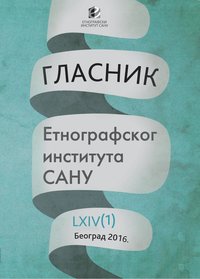Друштвени поредак и социјална аномија: концепти заједнице и друштва у постсоцијалистичкој Србији
DOI: 10.2298/GEI1601093S ; UDC: 316.334.52(497.11)"199/20"
Сажетак
У академској литератури се понекад могу наћи тврдње да је постсоцијалистичка трансформација у Европи довела до “моралне дезинтеграције” локалних заједница. На слична разумевања постсоцијалистичке трансформације у Србији наишла сам и током свог рада на терену, у Новом Саду, средином прве деценије XXI века, а затим и у поновљеној студији 2013. и 2014. године. Људи са којима сам радила друштво перципирају као мање-више кохрентну целину у којој важе јасна морална правила. Другим речима, друштво као морална заједница настаје формирањем заједничких моралних назора и осећаја узајамних обавеза, чијим еродирањем друштво почиње да пати од аномије. У овом раду разматра се како се ове широко распрострањене идеје односе према концептима заједнице и друштва, истовремено се кроз њих преламајући и дефинишући их.
Кључне речи: постсоцијалистичка Србија, заједница, друштво, морал, аномија.
Reference
Spread of Nationalism. London: Verso.
Bakalaki, Alexandra. 2003. “Locked into security, keyed into modernity: The selection of burglaries as source of risk in Greece”. Ethnos 68(2): 209-229.
Besnard, Philippe. 2005. “Anomie and fatalism in Durkheim’s theory of regulation”. In Emile Durkheim sociologist and moralist, ed. Stephen P. Turner,
163-183. London and New York: Routledge.
Bourdieu, Pierre. 1990. In Other Words: Essays Toward a Reflexive Sociology.
Stanford: Stanford University Press.
Bourdieu, Pierre and Loïc Wacquant. 1992. An Invitation to Reflexive Sociology.
Chicago, IL: University of Chicago Press.
Brković, Čarna and Andrew Hodges 2015. “Rethinking world anthropologies
through fieldwork: Perspectives on ‘extended stay’ and ‘back-and-forth’
methodologies”. Anthropological Notebooks 21(1): 107–120.
Chamboredon, Jean-Claude, Jean-Claude Passeron and Pierre Bourdieu. 1991.
Craft of Sociology: Epistemological Preliminaries. Berlin and New York:
de Gruyter.
Creed, Gerald. 2004. “Constituted through Conflict: Images of Community (and
Nation) in Bulgarian Rural Ritual”. American Anthropologist 106(1): 56-
70.
Dirkem, E. 1972. O podeli društevnog rada. Beograd: Prosveta.
Dirkem, E. 1997. Samoubistvo. Beograd: BIGZ.
Gal, Susan and Gale Kligman. 2000. The Politics of Gender after Socialism: a
Comparative Historical Essay. Chichester and Princeton, NJ: Princeton
UP.
Graeber, David. 2001. Toward an Anthropological Theory of Value: the False Coin
of our own Dreams. New York and Basingstoke: Palgrave.
Gregory, Chris. 1982. Gifts and Commodities. London: Academic Press.
Greenberg, Jessica. 2011. “On the Road to Normal: Negotiating Agency and State
Sovereignty in Postsocialist Serbia”. American Anthropologist 113(1): 88–
100.
Hann, M. Chris.1993. “Introduction: Social Anthropology and Socialism”. In Socialism: Ideals, Ideologies, and Local Practice, ed. Chris M. Hann, 1-26.
London and New York: Routledge.
Harloe, Michael. 1996. “Cities in Transition”. In Cities after Socialism: Urban and
RegionalChange and Conflict in Post-Socialist Societies, ed. Gregory Andrusz, Michael Harloe and Ivan Szelenyi, 1-29. Oxford: Blackwell.
Herzfeld, Michael. 1986. Ours Once More: Folklore, Ideology and the Making of
Modern Greece. New York: Pella.
Herzfeld, Michael. 1999. Anthropology through the Looking-Glass: Critical Ethnographyin the Margins of Europe. Cambridge: Cambridge UP.
Jansen, Stef. 2005. Antinacionalizam: Etnografija otpora u Beogradu i Zagrebu.
Beograd: Biblioteka XX vek.
Jansen, Stef. 2015. Yearnings in the Meantime: ‘Normal Lives’ and the State in a
Sarajevo Apartment Complex. New York and Oxford: Berghahn Books.
Joseph, Miranda. 2002. Against the Romance of Community. Minneapolis and London: Univ. of Minnesota Press.
Kahn, S. Joel and Francesco Formosa 2002. “The Problem of ‘Crony Capitalism’:
Modernity and the Encounter with the Perverse”. Thesis Eleven 69: 47-66.
Lazić, Mladen. 2011. Čekajući kapitalizam: nastanak novih klasnih odnosa u Srbiji.
Beograd: Službeni glasnik.
Mandel, Ruth. 2006. “Seeding Civil Society”. In Socialism: Ideals, Ideologies, and
Local Practice, ed. Chris M. Hann, 279-296. London and New York:
Routledge.
Nazpary, Joma. 2002. Post-soviet Chaos: Violence and Dispossession in Kazakhstan. London: Pluto Press.
Platz, Stephanie. 2003. “The Shape of National Time: Daily Life, History, and Identity during Armenia’s Transition to Independence 1991-1994”. In Altering
States: Ethnographies of Transition in Eastern Europe and the Former Soviet Union, eds. Daphne Berdahl, Matti Bunzl and Martha Lampland, 114-
138. Ann Arbour: The Univ. of Michigan Press.
Radović, Srđan, 2009. Slike Evrope: Istraživanje predstava o Evorpi i Srbiji na
početku XXI veka. Beograd: Ethnografski institut SANU.
Read, Rosie. 2007. “Labour and Love: Competing Constructions of 'Care' in a
Czech Nursing Home”. Critique of Anthropology 27(2): 203–222.
Rose, Nikolas. 1999. Powers of Freedom: Reframing Political Thought. Cambridge: Cambridge UP.
Simić, Marina. 2014. Kosmopolitska čežnja: etnografija srpskog postsocijalizma.
Beograd: Centar za studije kultue FPN i Čigoja štampa.
Smith, Adam. 1998. An Inquiry into the Nature and Causes of the Wealth of the Nations. Washington, D.C.: Regnery Publishing, Inc.
Watts Miller, William. 2003. Durkheim, morals and modernity. London and New
York: Routledge.
Young, M. Iris. 1986. “The Ideal of Community and the Politics”. Social Theory
and Practice 12(1): 1–26.
Yurchak, A. 2006. Everything was Forever, Until It Was No More: The Last Soviet
Generation. Princeton and Oxford: Princeton UP.
<https://www.ei.sanu.ac.rs/index.php/gei/article/view/152>.
Датум приступа: 06 dec. 2025






